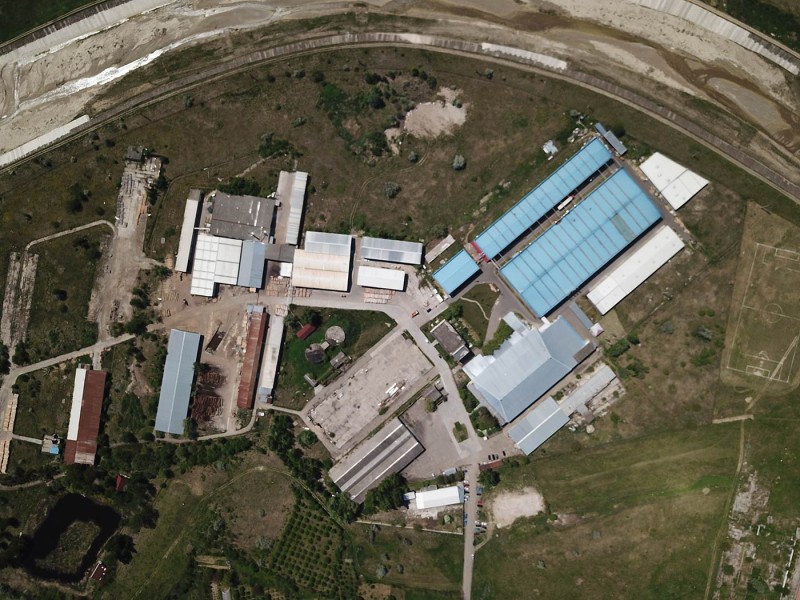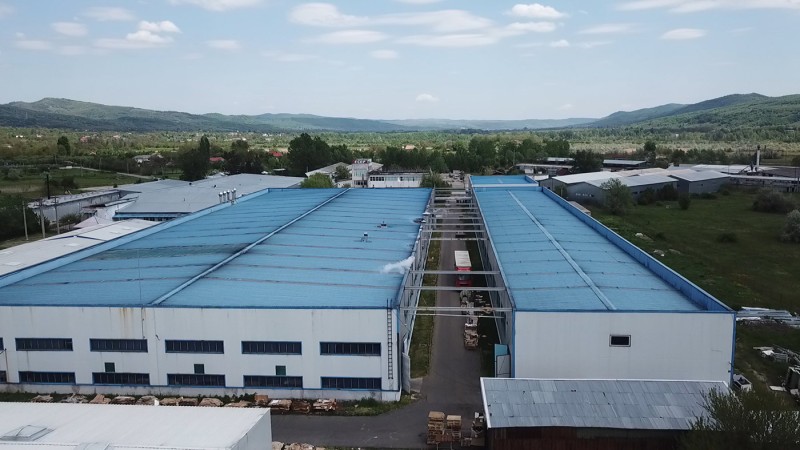Romanian authorities are investigating China Tobacco’s main factory in Europe in connection with the possible smuggling of large quantities of cigarettes with organized crime groups, OCCRP has learned.
The factory, located in a verdant, hilly region 140 km outside Bucharest, flew under the radar for years until OCCRP revealed that a senior executive there had been involved in smuggling cigarettes into Italy alongside the Camorra organized crime group.
Now, reporters have discovered that prosecutors within Romania’s Directorate for Investigating Organized Crime and Terrorism have been looking into operations at the factory, which is run by the China Tobacco International Europe Company (CTIEC).
The probe has its roots in 2014, when, border police and customs agents began noticing that containers filled with millions of cigarettes were leaving the facility, but consistently failing to reach their destinations –– a telltale sign of smuggling.
“Many of the containers exited Romania via Hungary and then Ukraine or Transnistria, and after that they were vanishing,” said a source close to the investigation, who spoke on condition of anonymity because the probe is ongoing.
“Millions of cigarettes also disappeared after reaching Bar harbor, in Montenegro,” the source added.
In total around 20 to 30 containers disappeared from the factory.
The Directorate declined to provide further information about their probe, saying that answering reporters’ questions could jeopardize the outcome of the ongoing investigation.
But OCCRP has learned that CTIEC shipped large amounts of cigarettes to fake companies, and businessmen who have been accused of smuggling.
The sales appear to have violated Romanian regulations under the FCTC, a global treaty governing the tobacco trade. Among the irregularities, CTIEC appears to have failed to carry out required background checks on companies and individuals it sold to, and did not provide security and monitoring for shipments leaving its factory.
CTIEC did not respond to a request for comment. In 2020, the company told OCCRP it had been diligent about checking its buyers’ credentials and had implemented a system to track where all of its cigarettes ended up.
Despite the company’s claims, prosecutors say that more than 10 million cigarettes disappeared after leaving the factory, raising the possibility that they were funneled into the black market, reaping huge profits by avoiding European Union taxes. “This is the classic way to export cigarettes into illegal markets — send it to a country and then it disappears,” said Luk Joossens, a tobacco control expert and special adviser to Smoke Free Partnership, a coalition of anti-smoking groups in Europe.
While dozens of containers have gone missing over the years from CTIEC’s Romanian factory, one incident in particular highlights how such smuggling can occur. At the center of this case are two CTIEC executives, a businessman with connections in Jordan who is based in the cigarette-smuggling hub of Naples, and an Irish man suspected by authorities in his home country of links to organized crime.
In June 2014, the Naples-based businessman, Ali Rashed, placed an order for 4.5 million cigarettes from CTIEC. Rashed –– who is originally from Jordan and ran for Senate as a member of Italy’s right-wing Lega Nord party in 2013 –– paid $38,700 for the shipment, according to Romanian prosecution documents.
According to the initial contract, the cigarettes were to be purchased by his company, called Ali Rashed Est, and delivered to Jordan. They would be sold under the brand name IDEA, which he had trademarked. Rashed’s IDEA cigarettes were already known to Italian authorities, who had confiscated a shipment from the port of Salerno six months before he placed the order with CTIEC. (OCCRP was unable to reach Rashed for comment.)
Before the shipment even left the factory in Romania, Ali Rashed Est changed its plans and sold them to a U.K.-registered company.
The U.K. firm –– which has since been dissolved –– was co-owned by an Irish national whom Irish prosecutors consider a “suspected criminal,” according to confidential documents obtained by OCCRP, which cite information from Irish authorities.
“The cooperation partners within the Irish Tax Authority mentioned the fact that at this moment they are carrying out informative profiling activities of a group of smugglers of cigarettes and other excisable products, among whom is” the Irish man, says one of the documents, a note from an attache at the Romanian Embassy in Dublin to Romanian police.
On paper, the U.K. company was to send the cigarettes by truck to the Latvian capital, Riga, where a firm called Prodimpekss Logistikas Grupa would receive them. From there, they were to be sent to Moscow, to a company called Komus Arzat.
However, the Latvian company told OCCRP it had never been involved in such a deal and never received any cigarettes from China Tobacco, while the Russian firm appears to be completely fake. The Russian commercial registry has no record of such a firm, and no company with that name exists at the Moscow address the papers list for it.
Instead, the cigarettes left the CTIEC factory in Romania and simply vanished.
Under the World Health Organization treaty that governs the global tobacco trade, which has been signed by both Romania and China, CTIEC is required to carry out background checks on its clients. The measure is intended to verify the identity of the buyer, make sure he or she does not have a criminal record, and ensure that the supplier knows where the cigarettes will be sold.
However, CTIEC –– which is part of a massive Chinese state-owned tobacco conglomerate known as China Tobacco –– failed to check Rashed, or any of the companies involved, according to Romanian court documents.
The sheer complexity of the voyage planned by Rashed should have raised suspicion, according to Joossens.
“In principle you are allowed to do that,” he explained, “but if you want to do a straight business you export directly to the country of your destination. If you do illegal business you make it as complicated as you want.”
Romanian investigators suspect that two CTIEC executives may have hidden the truth about the way the tobacco transport was organized: a regional director and a sales manager. Within two years of Rashed’s 2014 cigarette purchase, the same two factory officials would be investigated for tobacco-related infractions in separate cases.
Irregularities at the factory suggest CTIEC executives willingly allowed the shipment to disappear, according to prosecutors.
Romanian regulations require CTIEC to provide a security escort for trucks leaving the factory. The security company is meant to follow the shipment to its destination within the EU, or until it leaves the economic and political bloc.
That didn’t happen, according to prosecution documents.
Mariana-Lenuța Drăgulin, at that time a mechanic working for CTIEC, told Romanian prosecutors she remembered the shipment, because it was allowed to leave the premises without an escort, which was very unusual.
“Although, as a rule, all transports loaded with cigarettes were leaving the factory accompanied by people belonging to a security company, this time the truck left unaccompanied,” she said in her testimony to prosecutors.
Romanian investigators have also pointed to the driver who picked up the cigarettes from CTIEC, noting that he failed to provide proper documentation.
The driver –– an Irish man who appears to have been a partner of the owner of the company that bought the cigarettes –– should have submitted original documents to be checked by CTIEC and sent to the customs authority. Instead, he showed up with easily-forgeable photocopies.
"At the level of the Irish police, there is information that the named [person] is involved in criminal activities in the line of freight transport using a truck," reads an email from an attache at the Romanian Embassy in Dublin to Romanian police.
Since CTIEC didn’t hire a security company to accompany the truck and track the shipment, Romanian customs never received an alert that it had left the EU. That notification should have come once the shipment left Riga for Moscow, according to the paperwork.
After failing to receive the alert, Romanian customs agents raided the CTIEC facility.
While the subsequent investigation has turned up details of how the alleged scam worked, the final destination of the cigarettes remains a mystery. But if they escaped the notice of customs authorities in the EU, the profits would have dwarfed the $38,700 Rashed’s company paid CTIEC for the cigarettes.
On the black market, just that one shipment of smuggled cigarettes could have raked in around $900,000, according to estimates from Italian financial police.










